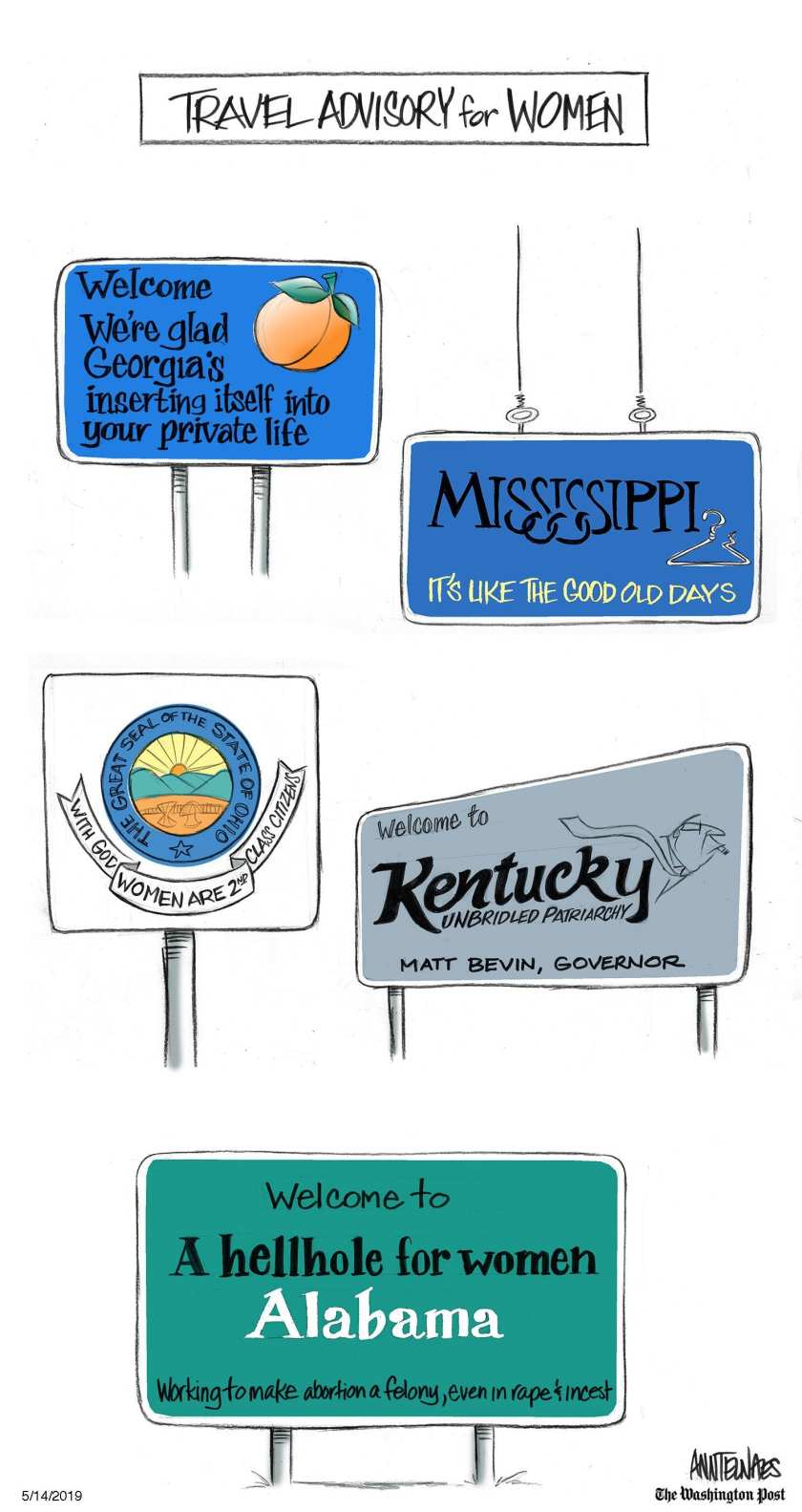Month: May 2019
Aardvarks En Vacances

Dr. Aardvark and I will be away for a couple of weeks. Probably not much will happen while we’re gone.
I’m Really Glad I’m Old—and I Sort of Dread the Next Reincarnation
Oh, That Explains It!

Kathleen Parker has helpfully explained that Alabama and Georgia enacted their new abortion laws because of pro-abortion extremism in New York and Virginia.
Georgia legislators apparently cannot think for themselves, while Alabama senators are devoid of any moral agency. This is helpful information.
Moreover, I am pleased to report, the above insight comes nowhere near exhausting Ms. Parker’s fountain of wisdom. She goes on to explain,
Where insight fails, facts are often helpful: Biologically, life begins at conception. Full stop. A fetus is not part of a woman’s body except as is umbilically necessary to sustain its life. Otherwise, it is a free-floating human being with its own unique DNA. If left to develop according to nature’s course, the little tadpole would become a fully formed human baby and, barring unforeseen circumstances, grow up to become a regular reader of this column.
I will pass over the fact that a sperm also has its own unique DNA, as does an unfertilized egg.
And the fact that, if it were literally true that “life begins at conception,” then conception would involve the union of two non-living substances, as if you were mixing salt and talcum powder, and voilà, a fertilized egg!
But I will pause to observe that, despite her certainty about when “life begins,” Ms. Parker nevertheless is comfortable calling the Alabama and Georgia position “extremist.” Should we therefore infer that Ms. Parker would be fine and dandy with infanticide, provided the infants in question were born of rape or incest? I think not. She just appears to be confused.
Seven Takeaways
1) The issue of how to regulate abortion will never be solved by competitive hurling of adjectives at 50 paces.
2) The issue will never be solved by scientific fact.
3) The issue will never be solved by showing pictures of a fetus in at some given stage of development and saying, “Looky! Looky! Looky! And, while you’re looking at the pictures, please emote at the maximum possible level.”
4) As a practical matter, the issue will never be solved except by recognition that regulating abortion is not a matter of moral absolutes but instead a matter of finding ways to reconcile competing valid considerations. That, together with an understanding that people who would draw the line differently than you are not necessarily a moral leper.
5) Even if everyone gets off their high horse—and that’s not likely to happen soon, but please indulge the hypothetical assumption—the various states, left to their own vices, would draw the line in very different places.
6) Congress could try to draw the line, but there would be many constitutional and other obstacles in the way.
7) As a practical matter, the only entity capable of drawing the line for the country as a whole is the Supreme Court. That’s exactly what they did in Roe. If they don’t like where Roe drew the line, then they can draw it someplace else, for example, at the “fetal heartbeat” stage.
I hope they don’t, but they certainly could.
Absolute Rights, Competing State Interests, and Autocracy

Rachel Larrimore, The Politics of Abortion Are Polarized, But People Aren’t
Michelle Goldberg, Post-Roe America Won’t Be Like Pre-Roe America. It Will Be Worse
American Bar Association Journal,Alabama governor signs abortion ban; which cases are headed to the Supreme Court?
Ginia Bellafante, Abortion and the Future of the New South
Martin Longman, Is Trump the End of Reaganism or the End of Democracy?
A Preliminary Observation on “Extremism” and on Majority Opinion
In many policy debates, including the debate over the regulation of abortion, one may lay out a set of alternative views and arrange them along a spectrum. The policy choices at either end of the spectrum may accurately, and literally, be characterized as “extreme.” But that accurate description tells me nothing—nada, rien, zilch, bupkus—about whether I should or should not adopt one of the competing “extreme” views, or whether it would be best to embrace one of the policy choices in the middle.
When we add in polling data, and the polling data show—yes, friends and neighbors, data are plural—that the majority of our fellow citizens embrace policy options toward the middle of the spectrum, that still tells me very little about which choice is optimal. But these data may tell me a lot about which policy choices are politically viable, or not.
Absolute Rights Versus Competing State Interests
Some claim that legal regulation of abortion should be based on equating a newly fertilized egg with a newly born baby. That is the position enacted into law by the Alabama Legislature: “natural law” gives the same rights to a zygote as it gives to a person, and the Supreme Court should so rule. And, inasmuch as “natural law” applies with the same force in New York as it applies in Alabama, the Supreme Court should outlaw abortion throughout the United States, with no exceptions for rape or incest.
At the other end of the policy spectrum, some assert that, until she gives birth, a pregnant woman has the absolute right to control her body, including the right to terminate the pregnancy. (Again, to say that that policy view lies at one end of a spectrum says nothing whatsoever about whether it is right or wrong.)
Alternatively, the issue may be approached, not as an issue of competing absolute rights, but instead as an issue of competing valid state interests: the state interest in protecting everyone’s right, including pregnant women, to control their own bodies, versus the state interest in protecting potential human life.
From this point of view, there is little moral difference between a newly born baby and a baby who is still in the womb but would be viable outside the womb. Likewise, there is little moral difference between a fertilized egg and an unfertilized egg. It’s a question of where to draw the line: at viability, at the point where a heartbeat is detected, or somewhere else. (And, maybe, one reconciles competing valid state interests by drawing the line at different points in the pregnancy, depending any one of a variety of circumstances.)
Polling data, state legislation, and jurisprudence all show that a large majority of us view the matter as one of competing valid state interests, not absolute and unqualified rights. That tells us nothing about whether the competing-valid-state-interests approach is right or wrong in some metaphysical sense. But it tells us a lot about whether either “extreme” position could prevail without being shoved down the throats of the majority of the population.
Alabama Yearns for Autocracy
The Martin Longman post cited above doesn’t address abortion, but I think it’s an excellent look at how the American right has evolved. In essence, a portion the right—indeed, quite a large portion—have come to understand that they cannot prevail, they cannot keep on living in the kind of society they want to live in, unless they impose dictatorship on the majority of the nation’s population.
That view, in my estimation, is entirely accurate. So I don’t fault them for an inaccurate understanding of reality. Because I think their understanding of reality is correct.
Nor, as an abstract matter, do I find fault in their belief that some principles justify ignoring the will of the majority. Pretty much every progressive believes that, too.
Hurling adjectives like “extreme” or “anti-democratic” won’t cut the mustard. We must fight, and fight to the finish. That is, if we want to keep living in an inclusive, just, and reality-based world.
The Fallback Position: Autocracy on the State Level
Alabama wants a national autocracy, led by a theocratic Supreme Court majority. By contrast, all of those states that have passed fetal heartbeat bills are saying, overturn Roe, return abortion regulation to the states, and just let us, in our little reactionary enclaves, adopt a form of competing-valid-state-interests analysis that heavily emphasizes the interests of fetuses versus the rights of women.
To Cert or Not to Cert?
As I noted recently, any four Supreme Court justices can force the Court to hear a case.
In a 2016 dissenting opinion, Justice Thomas flatly declared that the constitutional right to abortion is bogus: there is no such right. In a separate dissent in the same case, Chief Justice Roberts and Justice Alito allowed as how the existence of the right to an abortion was highly controversial, but was not at issue in the case before them. Now, Roberts, Thomas, and Alito have been joined by Gorsuch and Kavanaugh.
What will happen now? Of course, I don’t know, and neither does anyone else.
Most likely, five of the nine justices are of the view that there is no flat constitutional right to abortion, even on the morning after the night before. That implies that states may limit the right to an abortion. It does not necessarily imply that zygotes have a constitutional right to life, and that said constitutional right applies in New York just as it applies in Alabama.
Nor, as a matter of legal logic, would overturning Roe necessarily imply that the states are free to regulate in ways that entirely disregard a pregnant woman’s rights.
But, that said, if Alabama wants to require a 13-year old raped by her uncle to carry the child to term, what is the constitutional principle that would limit Alabama’s legislative choice? Once you have overturned Roe on the ground that there is no general constitutional right to an abortion, it’s really awkward to turn around and discover a constitutional right to an abortion in some situations, but not others.
And, apart from the jurisprudential awkwardness, there is also the political hornet’s next you’re knocking over—and that’s a big threat to continued plutocratic Republican rule, which is the thing you really care about. Thus, you would think there might be multiple reasons why it might be hard to get four votes for cert, in advance of the 2020 election.
On the other hand, with all those fetal heartbeat laws, it’s gonna look pretty cowardly to decline cert in each and over appeal.
In sum, I think that the five musketeers are up the creek without a paddle. And it couldn’t happen to a nicer bunch of guys.
The Alabama Human Life Protection Act

Text of the Alabama Human Life Protection Act
Prof. Mary Ziegler, Abortion Opponents Think They’re Winning. Have They Set Themselves Up to Fail? Alabama, Georgia and the fetal personhood trap.
Washington Post, Abortion ban reaction: Democrats erupt, Republicans stay quiet as both sides see an impact in the 2020 election
The Theology of Abortion
When the priest says the words, “Hoc est corpus,” a bakery product symbolizing the body of Christ is transformed into the actual body of Christ—at least, according to one theological position.
A sperm has the potential to fertilize an egg and, in the fullness of time, become a baby. An unfertilized egg is likewise a living organism with the potential to be fertilized and, in the fullness of time, become a baby. A fertilized egg is a living organism that also has the potential, in the fullness of time, to become a baby.
The distinction between the fertilized and the unfertilized egg is that, according to one theological position, just as “Hoc est corpus” transforms a bakery product, so also fertilization corresponds with the fertilized egg’s possession of an immortal soul.
Yesterday, the state of Alabama, invoking alleged principles of universal human rights, enacted a sectarian theological position into law: fertilized eggs are the moral equivalent of babies.
The Moral Equivalent of Genocide
Lest there be any doubt about its views, the Legislature, in Section 2(i) of the new law, declared that the 50 million abortions performed since Roe v. Wade were worse than Hitler’s genocide, Stalin’s murders, or Pol Pot’s murderous regime. They threw in The Rwandan genocide for good measure. (Inexplicably, they omitted to mention the ethnic cleansing of Native Americans in Alabama and elsewhere, or the loss of life among kidnapped Africans.)
An “Extreme” Position Required by Logical Consistency
After an emotional debate, the Legislature rejected any exception for rape or incest. It’s a universal human inclination to want to pin adjectives onto complex situations. Accordingly, many have employed the word “extreme” to describe a law requiring a rape victim to bear her rapist’s child.
Actually, while you may use whatever adjective suits your fancy, denying an exemption for rape or incest is an exercise in consistency. Because actual babies born of rape or incest are morally equivalent to all other babies.
But, Oddly, Also An Extremely Inconsistent Position
The first sentence of Section 5 of the Alabama law provides, “No woman upon whom an abortion is performed or attempted to be performed shall be criminally or civilly liable.” On the other hand, physicians who perform abortions commit a Class A felony, punishable by imprisonment from 10 to 99 years. (Prior Alabama law—unenforceable under Roe—had previously applied both to mother and physician, and had made abortion a misdemeanor.)
So, as far as physicians are concerned, a fertilized egg is the moral equivalent of a baby and if they perform an abortion they are the moral equivalent of the Nazi doctors.
But as far as pregnant women are concerned, a fertilized egg is not the moral equivalent of a baby, it is the moral equivalent of a sperm or an unfertilized egg. (And, per the language of the statute, that rule applies if the woman successfully seeks illegal sub rosahelp in the abortion, or if she manages to abort herself.)
You really have to do some serious damage to your mind if you think a zygote is a baby for one purpose but not a baby for another purpose.
As they like to say in Alabama, that dog won’t hunt.
What Will the Courts Do?
I assume the Alabama district courts and the Eleventh Circuit Court of Appeals will enjoin enforcement of the statute, citing Roe v. Wade and other binding precedent. (If they judges are Fetus People, they can feel free to insert some dictum imploring the Supreme Court to overrule Roe and purge the nation of its wickedness. But it will only be dictum.)
Will the Supreme Court “Take Cert”?
Supreme Court review of lower court decisions is discretionary, not mandatory, and the Court decides to review only about ten percent of the cases where appeal is sought. (The decision to review is called granting a writ of certiorari, or “taking cert” for short.)
Here, the Supreme Court could decide just left the inevitable Eleventh Circuit decision against the Alabama law stand, without any further consideration (and thus “deny cert”). Last evening, I refreshed my recollection about how many justices can force the Court to “take cert.” The answer is four.
So, if Thomas, Alito, and Gorsuch want the Court to take cert, overturn Roe, and uphold the Alabama law, they will, in the first instance, have to get either Roberts or Kavanaugh to join in, so that there will be at least four votes for cert.
A Cloudy Crystal Ball
Lots of people—including lots of people who know a damn sight more about this stuff than I do—are making predictions about how this will all play out. Having, myself, suffered humiliation in the past from making wrong predictions about how the Supreme Court would decide antitrust cases, my strong sense is that no one know what will happen, including any of the nine folks in the black robes.
Winnng by Losing, Losing by Winning
But we are on much more solid ground in predicting political fallout. If all five of the Republican justices—Chief Justice Roberts, and Associate Justices Thomas, Alito, Gorsuch, and Kavanaugh—are the inveterate anti-abortionists that some hope, then they will take cert on the Alabama law or on one or more similar laws in other states, consign Roe to the dustbin of history, and leave abortion to the states.
If that happens—and it may very well happen—the Fetus People, especially the Fetus People who really don’t like Trump very much, will tend to stay home in 2020, while all the progressives will be animated by a white hot anger. If the election is close, this factor could make the difference.
Abortion Jujitsu
If, on the other hand, at least one of the right wingers decides to act, not as an anti-abortion zealot but instead as a Republican political hack, the smart choice would be to keep the abortion issue alive in 2020—on the assumption that every single one of the Fetus People will go to the polls and vote for Trump, so that Trump will get to replace RBG and they will get their no-abortion majority on the Court.
Kavanaugh, in particular, might be well positioned to perform some political jujitsu. He could vote against cert, or vote against overturning Roe in full, thereby simultaneously redeeming his promise to Susan Collins and doing his bit to reelect Trump. I wouldn’t put it past him.
Travel Advisory

Maybe Add in The Manchurian Candidate, While You’re At It

Apple v. Pepper, Kavanaugh v. Gorsuch: Here’s a Howdy Do
You probably wouldn’t want to leave your daughter alone with Brett Kavanaugh, but it’s looking like he might turn out to be not the world’s worst Supreme Court justice.
In Apple v. Pepper, decided today, Kavanaugh not only joined with the Court’s four liberals to hand an initial victory to consumer class action plaintiffs, he also wrote the opinion for the majority. Justice Gorsuch joined with the Chief Justice and the two other wingnuts in dissent. Their interpretation of antitrust standing would have shitcanned consumers, to the enrichment of plutocrats.
Apple’s App Store Monopoly
If you want an app for your iPhone, you have to buy it from Apple, at its App Store. You can’t get it anywhere else. And Apple has some rules for developers: you have to pay Apple a 30 percent commission on sales, and your price has to end in 99 cents. Subject to those rules, you can set whatever price you want, and you can sell as many apps as you can persuade people to buy, and Apple will remit the proceeds of the sale—less, of course, the 30 percent commission.
The district court allowed a class action of plaintiff iPhone owners to proceed, on the theory that Apple had unlawfully created, maintained, and profited from a monopoly in the retail sale of iPhone apps.*
How to Apply an Old—and Wrongly Decided—Precedent?
In 1977 the Supreme Court decided Illinois Brick Co. v. Illinois, ruling that only direct purchasers may maintain antitrust litigation to recover damages in the nature of an “anticompetitive overcharge.” I used to be a great fan of the Illinois Brick decision, but I was wrong. The Court’s decision was based on some pretty sophisticated reasoning about economics and efficiency in litigation, but it was wrong because it generally produced unjust results. “Direct purchasers,” such as wholesalers, typically pass on most or all of the “overcharge,” but the Illinois Brickdecision rewarded the middlemen while leaving the ultimate consumers out in the cold, and holding the bag. Because it was unjust, the decision resulted inconsiderable legal chaos. (I don’t want to prolong this post by elaborating. Just trust me on this.)
Now, back to the current case: Apple against the consumer class. Apple tried to get the case thrown out because (so it said) the real direct victims of its little retail monopoly were the app developers—the people who paid the exorbitant 30 percent commissions and who had to decide how much of that exorbitant price they could get away with passing on to the iPhone users.
The consumer plaintiffs, however, had a comeback argument that appealed to the four liberals and to Justice Kavanaugh. Their argument was that whatever injustice the Illinois Brick rule might work in other situations, here the plaintiff consumers were indeed direct purchasers from Apple, and paid the anticompetitive overcharge directly to Apple. They were clearly “direct purchasers.” They had a plausible case on the merits. They fit right within the literal language of the 1977 case. So let them proceed to trial.
In my view, both sides had decent technical legal arguments. But Kavanaugh’s analysis was the more persuasive, the more straightforward, and the result that best vindicated the interests of justice. Gorsuch, by contrast, did a good job twisting himself into a pretzel in an unsuccessful effort to protect a powerful defendant against a plausible antitrust claim. Gorsuch would have relied on the logic and reasoning of Illinois Brick to extend the reach of the case and apply it to a novel situation, contrary to its literal language. That’s not the way the law should work. Where a case with precedential value was wrongly decided, you don’t extent it, you limit its reach.
The Lesson: A Fine Howdy-Do?
I don’t normally write about weedy antitrust issues on Trumped Progressives. But today’s opinion, read in light of this morning’s New York Times article on Kavanaugh and Gorsuch, conveys some faint hope that Justice Kavanaugh may actually try to do justice in the forthcoming constitutional struggles.
After all the storm surrounding his nomination and confirmation, it would be, would it not, a fine howdy-do if it turns out that Brett Kavanaugh’s historical destiny is to be the deciding vote against Trump and tyranny and in favor of the checks and balances underpinning the republic?
And Before I Go
This from Doyle McManus at the L.A. Times, Suddenly, conservative lawyers are condemning Trump for abuses of power.
* Allegations that manufacturers are monopolizing products designed to work with the basic product are common, and have been somewhat controversial. The argument would go like this. IPhones compete heavily with android devices. And, when you’re deciding whether to by an iPhone or a Samsung phone, you may look not only at the features and price of the phone itself but also at the features and prices of the available apps that could be used with either phone. So when you lump in the android apps into the market, Apple doesn’t have a monopoly all, or so the argument would go.
But that argument wasn’t part of the Apple v. Pepper case, at least not at this stage.
A Conspiracy Against Trump?
Let us, for a moment, do this thought experiment: let us think, not like a person of everyday decency and common sense, but instead like a professional Republican politician.
You have a dilemma. On the one hand, you have a Trump problem. His trade war threatens to flush the economy down the crapper. Even worse—yea, verily, even worse—his electability is very much in doubt. Look at 2018. Look at Texas today, where polling shows Biden beats Trump.Just by the hair of his chinny-chin-chin. But Biden still wins. In Texas.
But the other horn of your dilemma is that Trump remains highly popular among the Republican voting masses.
With all that in mind, keep on trying to imagine yourself a professional Republican politician. Ask yourself, how can we professional Republican politicians possibly escape this dilemma?
I’m not talking detailed tactics here. I’m talking overall strategy; the tactics can be filled in later.
Obviously, the general strategy would be to play Trump’s lickspittle in public, but to conspire against him in private.
With all that in mind, I commend to you this from thebulwark.com: Christian Vanderbrouk, Mike Pence, Leader of the Resistance? He could be in real trouble if the Trumpist media ever actually reads [sic] the Mueller report.
The Nature of His Delusions

Greg Sargent, Trump is staking reelection on one of his biggest lies
Yes, I know. You are sick and tired of Trump’s bullshit, and just wish it would all go away. Brethren and sistern, I feel your pain.
Nevertheless, he is still with us, at least for a season longer. And as long as he is still with us, it is worth knowing how much of his bullshit he believes, himself, and how much consists of stick-in-the-throat lies. By now, it’s plain there is some of each. But as time marches on, and we gain yet more familiarity with his disordered mind, it seems, at least to me, that the portion of his bullshit consisting of plain lies goes up, and the proportion consisting of rooted factual delusion is relatively low.
Greg Sargent does a nice job of dissecting Trump’s lies relating to trade with China—and how he’s preparing the ground for a loss in the trade war.
The delusion lies largely not in counterfactual beliefs on issues such as who pays the tariffs, but rather in the counterfactual belief that he can keep on bullshitting his way through life and get away with it.
**
Welcome to today’s readers from Canada, the Philippines, the UK, and the United States. Also to the good folks from Thailand who took a look in the last few minutes.
Three Wingnuts, Two “Centrists,” and Four Liberals

Adam Liptak, Kavanaugh and Gorsuch, Justices With Much in Common, Take Different Paths
Man bites dog. Gorsuch and Kavanaugh are not exactly two peas in a pod.
You may find this analysis of the current Supreme Court interesting.
No Balls at All
No, Charles Blow, Democrats are not “bringing their letter openers to a gunfight.” And in no way, shape, or form are they “scared witless.”
Democrats face an unprecedented and challenging situation. It shows neither lack of wit nor shrunken cojones to proceed cautiously and think carefully about how to play the cards they have.
Jerry Nadler is a mensch. And so is Nancy Pelosi.
Mr. Blow’s colleague David Brooks makes the opposite mistake: accusing Nadler of declaring a bogus constitutional crisis.
Jonathan Chait roasts Brooks on a spit and eats him for lunch.
Em … em … good.
We do have a constitutional crisis on our hands. Crises are not handled well by folks who stick their heads in the sand. Nor is JUST DO SOMETHING!!! likely to lead to an optimal outcome. Cojones are wonderful, but you need to think with your frontal lobe.
Get a grip, people.

Should We Rend Our Garments? Or Should We Just Savor the Sour Smell of the Flop Sweat?
Jeffrey Toobin, The Constitutional System is not Built to Resist Trump’s Defiance of Congress
Washington Post Editorial Board, Don’t let Trump run out the clock in court
Greg Sargent, The big unanswered question at the core of Trump’s corruption
Toobin—who, I think, should know better—goes the garment-rending route, lamenting that there is no effective constitutional check on Trump’s ability to stonewall. Sargent, meanwhile, savors the flop sweat, and expatiates on the point that Trump, sure as shootin’, is mighty scared of something. (Could it be that he’s been running a criminal enterprise, fueled by Russian mob money?)
There are lots of things we don’t know, and a few things we do know, or at least should know.
We know that, in the next weeks and months, it will be up to the courts to deal with Trump’s stonewalling of Congress. We don’t know how well or how badly the courts will do their job. But we can anticipate, I believe, that if the courts do their job—I said “if”—Trump will probably defy the courts just as he is defying Congress. And we can reasonably anticipate that, if and when Trump defies the courts, it will be up to other institutions—maybe including the military—to uphold the Constitution, or just to let the country devolve into a banana republic.
As I said, we don’t know what the courts will do, but let’s identify some of the straws in the wind, with particular focus on how the Federalist Society judicial types might react to the coming legal challenges.
Four Straws in the Wind
(1) As I noted in an earlier post, predictions that Trump will “run out the clock” do not fully take into account that courts have wide discretion over the pace of any particular lawsuit. As the Washington Post editorial notes, a district judge has just availed himself of that power to fast track Trump’s effort to block his own accounting firm from turning over financial records to the House Oversight Committee.
(2) You will remember how Sherlock taught us to listen for the sound of dogs that did not bark in the night. Well, here’s an example of a non-barking dog. Remember that statement signed by hundreds of former federal prosecutors, opining that they would definitely have charged obstruction based on the facts in the Mueller report?
Well, who from the Federalist Society contingent has stepped up to say they were wrong? Pretty much, nobody.
(3) Don McGahn, former White House counsel and Mr. Federalist Society court-packer extraordinaire, hasn’t exactly gone out of his way to defend Trump.
If, by chance, you are a newly appointed Federalist Society judge, and if you plan to decide cases based on gratitude instead of on the facts and the law—and perish the thought that any judge might hold such an attitude, but I’m just sayin’—then you have a much better reason to be grateful to McGahn than to Trump.
(4) An active contingent within the Federalist Society is urging the courts to do justice and to protect the Constitution. Check ‘em out at checks-and-balances.org.
And there is more at stake than mere constitutional principle. One reason why rightwing judges might want to preserve checks and balances is the fact that the next president may be a Democrat.
So I, for one, will be cautiously optimistic as I savor the sour smell of the flop sweat.
Meet the Press
Buck Up, Everybody
A new study asserts that Trump’s steady 41-43 percent support level disguises the fact that he is losing some ground among blue collar Midwesterners, while gaining support among many of the country club Ritchie Riches who previously held their noses.
The latter tend to be located in states where Democrats will win anyway. The former tend to be located in swing states.
So that’s nice.
Meanwhile, 62 percent of women disapprove of Trump, but only 46 percent of men share that regrettable sentiment.
The majority of men, it appears, are not a credit to their gender.
Fortunately, when they think about voting, men are inclined just to settle back and have another brewski. Female registered voters in the United States exceed male registered voters by five million. In 2016, 63.3 percent of registered female voters went to the polls, compared to 59.3 percent of registered male voters.
Buck up, everybody.
Sun Tzu, Meet Pocahontas; Pocahontas, Meet Sun Tzu

The Plum Line, Only one 2020 Democrat fully grasps the threat Trump poses:
In an important moment on the Senate floor, Warren took strong issue with Senate Majority Leader Mitch McConnell’s profoundly cynical effort to treat this all as a closed matter. “Case closed,” McConnell said, speaking not just about Mueller’s extensive findings of likely criminal obstruction of justice by Trump, but also about Trump’s eagerness to reap gain from Russia’s sabotage of our elections, which McConnell blamed on Barack Obama.
In response, Warren again called for an impeachment inquiry, but did more than this: She indicted the Republican Party as a whole for shrugging off Trump’s epic misconduct and wrongdoing.
Warren has also pointed out more forcefully than any rival that Trump tried to derail an investigation not just into his own campaign’s conduct, but also into the Russian attack on our democracy — which Trump has refused to acknowledge happened at all, hamstringing preparations for the next attack.
As McConnell’s speech showed, the GOP is all in with that as well. And the GOP appears all in with Trump’s escalating efforts to treat House oversight of the administration as fundamentally illegitimate. …
It’s strange that pundits take it on faith that Joe Biden would best win back blue collar whites who overwhelmingly backed Trump in 2016. We’re constantly told Trump won them by campaigning against an economy “rigged” by plutocrats, getting left of Hillary Clinton, who hailed from the corporate wing of the Democratic Party and thus was vulnerable against Trump’s (fraudulent) populist attacks. …
But Biden hails from the same precincts. Indeed, as Jamelle Bouie points out, Biden is implicated in many great elite failures that supposedly fueled Trump’s rise, including bipartisan neoliberal friendliness towards Wall Street and the Iraq War.
By contrast, Warren has offered the most detailed populist prescriptions in response to the “rigged” economy of any candidate, including policies to tax extreme wealth and reconfigure corporate power.
If Warren proves unable to appeal to blue collar whites, we’ll perhaps have to revise our story of 2016. But here again, Warren is the one with the biggest actual argument.
Trump exploited populist discontent and then embarked on a near-total betrayal via an embrace of GOP plutocracy, in the form of a massive corporate tax giveaway and a deregulation spree that further enabled elite corruption. These things, too, show Trump as both continuation and exacerbation — and Warren has offered the most systematic and comprehensive response to all of that, as well.
Running Out the Clock

I wish to make three points.
(1) “How Can He Do That?”
Title 26 of the United States Code, Section 6103, paragraph (f), subparagraph (1), states as follows:
Upon written request from the chairman of the Committee on Ways and Means of the House of Representatives, the chairman of the Committee on Finance of the Senate, or the chairman of the Joint Committee on Taxation, the Secretary[of the Treasury]shall furnish such committee with any return or return information specified in such request, except that any return or return information which can be associated with, or otherwise identify, directly or indirectly, a particular taxpayer shall be furnished to such committee only when sitting in closed executive session unless such taxpayer otherwise consents in writing to such disclosure.
The language is unqualified: “shall furnish such committee with any return.”
Some people—invariably, they are people who have not had the misfortune of attending law school—find it hard to grasp that a statute does not enforce itself. “How can they just ignore the law?” these people ask, as if they were asking a rhetorical question with a clearly negative answer: they can’t.
In fact, laws, even clear laws, do not enforce themselves.
You ignore the law by ignoring the law. There may (or may not) be adverse consequences for your willful disobedience, but you “can” always ignore the law and see what happens.
(2) “They’re Going to Run Out the Clock”
There are lots of talking heads this morning who are rending their garments over their prediction that Trump and his enablers will just “run out the clock” through the 2020 election. That prediction may turn out to be accurate. But people should be aware that courts have very wide discretion to control the pace of litigation before them. Where she deems it prudent, a judge can order the case to move forward at a rapid clip.
Nor is this the first time in Anglo-American jurisprudence when someone has tried to run out the clock. Back in medieval times, this scenario would arise. John Doe and Richard Roe both claim title to the same piece of real estate. Richard Roe decides to create some “facts on the ground” by constructing a building on the disputed property. Doe sues, and Roe tries to delay the proceedings. For hundreds of years, courts have understood that kind of tactic and have developed means to deal with it.
And here’s a related point. It’s much easier to run out the clock if a case requires resolution of factual issues, and there is lots of evidence about the facts. But the issue of how to interpret and apply section 6103(f)(f) is mainly a matter of law.
The House of Representatives has a two-step legal position: first, the law is clear, and there is no implied requirement to demonstrate a proper legislative purpose”; and (2) if our first argument is wrong, then, guess what, we’ve got proper legislative purpose up the wazoo. As one pundit asks,
There’s no public interest in discovering who is paying the mobbed-up, money-hemorrhaging failed casino operator whose sons have described him as reliant on Russian financing? Do Republicans believe Trump’s financial secrets contain no signs of serious corruption or vulnerability to leverage by a hostile power? Or would they rather not know?
Whether the statute does or does not require “a proper legislative purpose” is a pure matter of law. There is a certain complexity about the precedents on the scope of Congress’s power to investigate, but briefing and arguing the issue is not something that should take months and months to do.
And if the district court decides that, despite its. language, the statute requires “a proper legislative purpose,” then I think the existence of such a proper purpose may be found by judicial notice.
(3) Donald, You Need to be Careful What You Wish For
Nancy Pelosi is plainly right that Trump is goading the House to initiate impeachment proceedings.
At the same time, Trump is, today, moving forward with a vast stonewalling operation.
But if Trump really wants to stonewall successfully—including running out the clock till 2020—then the last thing in the world he should want to do is successfully goad the House to start impeachment.
Now, it’s theoretically possible that Trump has understood this conflict, and is stonewalling for the very purpose of goading the House into impeachment.
But it’s much more likely that Trump is an idiot who thinks he can pursue two contradictory strategies at the same time.

Multiple Felony Indictments, Part 2
I don’t know where all of this will lead—we are all on one hell of a rollercoaster ride—but my instinct tells me the former prosecutors signing the statement, now numbering more than 700, might be beginning to make a difference. I particularly appreciated the comments in the video from one of Kenneth Starr’s henchpersons.
Meanwhile, Dr. Aardvark and I dined at Happy Acres this evening with four of our progressive friends. (Crabmeat stuffed flounder. Very good.) Some of my friends took me to task for “continuing to defend Barr.” I deny that’s what I’m doing, but I adhere to the view that Barr’s performance is so bad that it isn’t a defense of Trump, it’s a parody of a defense of Trump. In short, on the available evidence, I believe Barr’s throwing the game. Certainly, he doesn’t seem to be trying very hard to fool anyone except Trump.
For a related perspective, see Barr has set himself up — and Trump — for embarrassment.
**
Today’s readers come from Canada, Germany, Pakistan, South Africa, the United States, and some unidentified location in the European Union. Greetings to all. Recent readers from Bosnia and Denmark appear to have had enough. I feel their pain.
The Unbearable Whiteness of Being

Eric Kaufmann, Whiteshift: Populism, Immigration, and the Future of White Majorities
Isaac Chotiner, A Political Scientist Defends White Identity Politics
Jonathan M. Metzi, Dying of Whiteness: How the Politics of Racial Resentment is Killing America’s Heartland
The Plum Line, We’re finally inching toward a smarter understanding of ‘electability’
As Jennifer Rubin lays out very well, Democratic voters are mainly concerned with electability. It’s pretty clear from the early polls that the nominee, whoever she or he may be, will be the person perceived by Democratic primary voters as the person most likely to win in the general election.
So, that much we know. But that leaves a host of intertwined questions, including
- Is it more important to focus on African-Americans and progressives, or it more important to try to win back white voters, especially in the Midwest?
- Is there, indeed, a tension between those two goals, or are they largely consistent with one another?
- Given the increasing weight of evidence that Trump voters groove to white identity politics, is there any way to compromise with, or accommodate, their white identity?
- Are there in fact two distinct forms of white identity: a racist putdown of others, and a relatively benign celebration of ethnic heritage?
- Should Democrats focus, as Obama did, on telling an inclusive story of “American” identity, while eschewing white identity as well as black identity?
- Where affirmative action criteria are based on race, not factors like income and social class, do poor white have at least some case to be made that they are being treated unfairly?
- Can Democrats improve their chances by just talking about health care—and, when racial identity is raised, just change the subject back to health care?
I find this whole conversation troubling and distasteful, and would rather think about something else. I wouldn’t be surprised if that’s true of you, as well. But whether we like it or not, these things need to be addressed.
I’ll just say this for now. I don’t think a celebration of “whiteness,” as such, makes much sense. I’m descended from Scotchmen, Englishmen (not a few of whom were Quakers, in the seventeenth century), and Frenchmen (not a few of whom were Huguenots). I can celebrate the English for inventing constitutional government. I can celebrate the Quakers and the Huguenots for standing up to religious persecution. And I can celebrate the Scots for … I suppose, really nice kilts and interesting musical instruments. Whiteness as such? I don’t think so.


